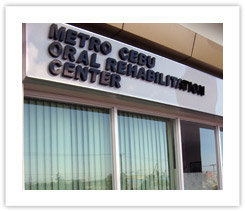

Clinic Address:
3rd Floor Room 308, Mob Bldg. (near Cebu Doctors' Hospital)
Gov. M.Roa Street, Capitol Site, Cebu City
NEWS / PROMOS
Hello Everyone! Good news! We are still offering a discounted rate on our Teeth Whitening / Bleaching. You can also avail a 10% discount on check up fees. Now, there's more reason to Smile the whole year through!
For Inquiries or Appointments, Please contact 09222-059946 or (6332) 511-7774
What is tooth decay?
Tooth decay is the process that results in a cavity (dental caries). It occurs when bacteria in your mouth make acids that eat away at a tooth. If not treated, tooth decay can cause pain, infection, and tooth loss. You can easily prevent tooth decay by brushing and flossing your teeth regularly, seeing your dentist for teeth cleaning and checkups, and avoiding foods that are high in sugar.
What are the symptoms?
Tooth decay usually does not cause symptoms until you have a cavity or
an infected tooth. When this occurs, a toothache is the most common symptom.
Treatment for tooth decay depends on how bad it is. You may be able to reverse
slight tooth decay by using fluoride. To fix cavities caused by mild tooth decay,
your dentist will fill the cavities with dental fillings. For more severe tooth
decay, you may need a root canal and a crown. In hopeless cases, your dentist may
have to remove the tooth.
What is TMJ Disorder?
It is a group of conditions that cause pain in and around the jaw area
(called "Temporomandibular Joint or TMJ) and nearby muscles.
Symptoms:
- face pain in jaw area, ear & nearby areas
- inability to open mouth comforta
- clicking popping or grating sounds in jaw area
- headaches, shoulder/back pain
- swelling in the side of face
- ringing in the ears, decrease hearing, dizziness
a. Over the counter pain medication/prescription medication
b. Gentle jaw stretching & relaxation exercises
c. Stabilization splint (biteplate/nightguard)
How Should I Care for My Teeth and Gums?
There are four basic steps to caring for teeth and gums:
- Brushing
- Flossing
- Eating right
- Visiting the dentist
1. Tips for Brushing
Brush at least thrice or twice a day. Brushing removes plaque, a film of bacteria that sticks to teeth. Use a toothbrush with soft, rounded-end bristles .To brush:
- Place a pea-sized of toothpaste on the head of the soft toothbrush.
- Place the toothbrush against the teeth at a 45-degree angle to the gum line.
- Move the brush across the teeth using a small circular motion. Continue with this motion cleaning one tooth at a time. Brush across the chewing surfaces of the teeth. Same thing to be done also to the inner surfaces of the teeth.
- Brush your tongue a few gentle strokes, brushing from the back of your tongue forward. This helps remove bacteria and freshens your breath.
- After brushing your teeth for two to three minutes, rinse your mouth with water.
- Replace your toothbrush with a new one every 3 to 4 months.
2. Tips for Flossing
Floss once a day. Flossing gets rid of food and plaque between the teeth, where your toothbrush cannot reach. To floss:
- Remove about an 18-inch strip of floss from the dispenser.
- Wind the floss around the middle fingers of each hand, leaving a 1-inch section open for flossing. Floss the upper teeth first, then the lower.
- Place the floss in your mouth and use your index fingers to push gently the floss between the teeth. Move the floss up and down against the tooth and up and around the gum.
3. Tips for Eating Right
Eat fewer foods that contain sugars and starches. These foods produce the most
acids in the mouth and the longer they stay in the mouth, the more they can damage
the teeth. Snacking on sugary foods can lead to tooth decay because most people don't
brush after snacks. Avoid snacking on:
- Candies, cookies, cakes and pie
- Sugary gum
- Crackers, breadsticks and chips
- Dried fruits and raisins
4. Dental Check-Ups
Visit your dentist at least once every six months. To maintain healthy teeth and gums, it's important to have regular check-ups and professional cleanings.
When should my child start seeing a dentist?
By the time your child is 6 months of age or before his/her 1st birthday, your dentist should assess the teeth's progress. After your first visit, schedule regular visits every 6 months or as your dentist recommends. Experts recommend that your child's dental care start at 12 months of age.